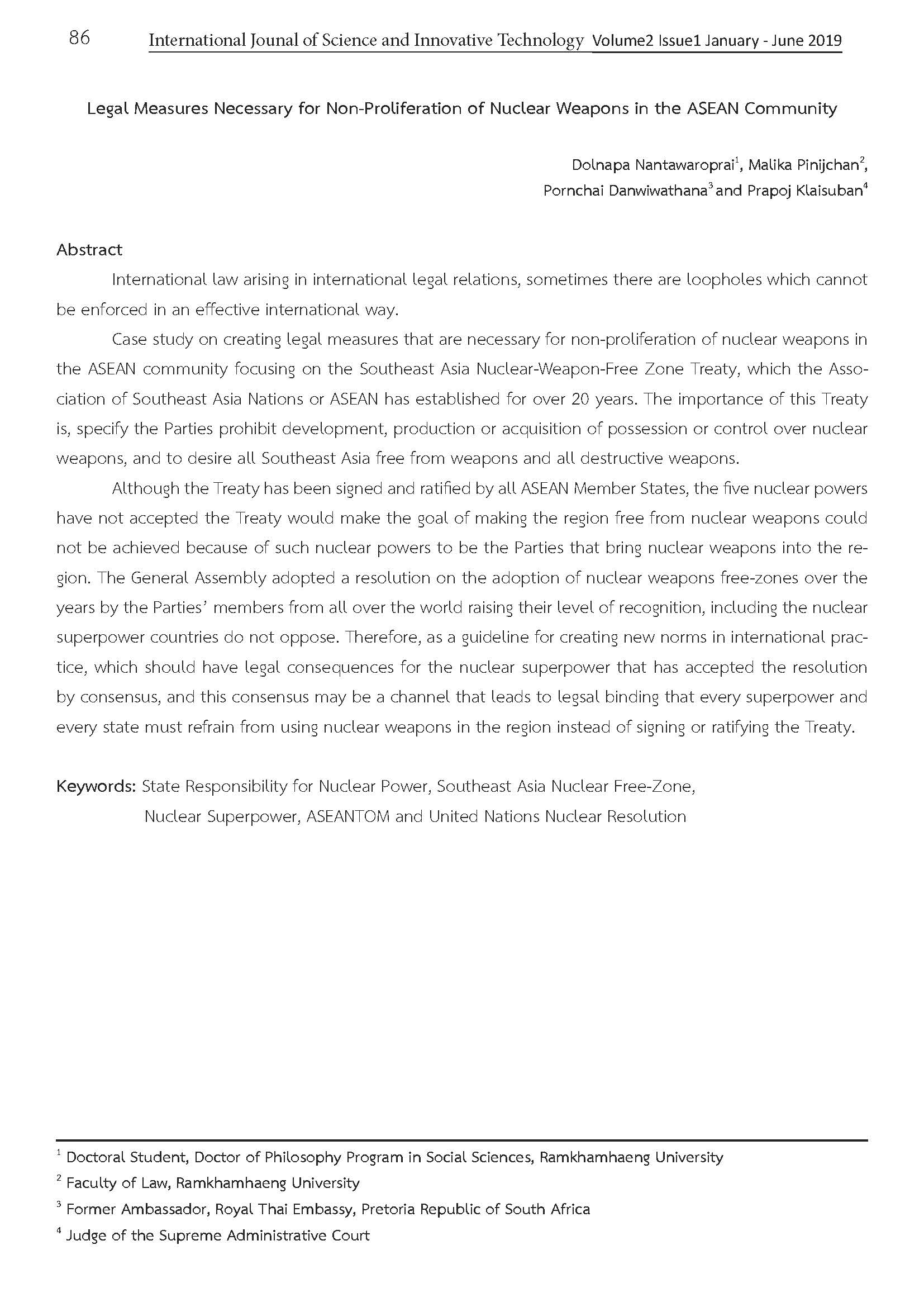Legal Measures Necessary for Non-Proliferation of Nuclear Weapons in the ASEAN Community
Main Article Content
Abstract
International law arising in international legal relations, sometimes there are loopholes which cannot be enforced in an effective international way.
Case study on creating legal measures that are necessary for non-proliferation of nuclear weapons in the ASEAN community focusing on the Southeast Asia Nuclear-Weapon-Free Zone Treaty, which the Association of Southeast Asia Nations or ASEAN has established for over 20 years. The importance of this Treaty is, specify the Parties prohibit development, production or acquisition of possession or control over nuclear weapons, and to desire all Southeast Asia free from weapons and all destructive weapons.
Although the Treaty has been signed and rectified by all ASEAN Member States, the five nuclear powers have not accepted the Treaty would make the goal of making the region free from nuclear weapons could not be achieved because of such nuclear powers to be the Parties that bring nuclear weapons into the region. The General Assembly adopted a resolution on the adoption of nuclear weapons free-zones over the years by the Parties’ members from all over the world raising their level of recognition, including the nuclear superpower countries do not oppose. Therefore, as a guideline for creating new norms in international practice, which should have legal consequences for the nuclear superpower that has accepted the resolution by consensus, and this consensus may be a channel that leads to legal binding that every superpower and every state must refrain from using nuclear weapons in the region instead of signing or ratifying the Treaty.
Article Details
References
and Nuclear Materials of Thailand Part 2. Bangkok: Office of Atoms for Peace, 2004.
Pornchai Danwiwat. International Trade and Environmental Law. 2nd edition, Bangkok:
Winyoochon Publishers, 2008.
Ratanaphon Chobplog. The list of Important Scientists. Bangkok: Ministry of Science and
Office of Atoms for Peace Technology, 2010.
Wichitwong Na Pomphet. Economic, 1st edition. Bangkok: Saengdao Publishers, 2013.
Somboon Sengiambut, Balance Field of Power. 1st Edition, Bangkok: Publishing Development
Co., Ltd., 2015.
Office of Atoms for Peace Ministry of Science. Nuclear Vocabularies. Bangkok: Office of Atoms
for Peace, 2004.
Office of Atoms for Peace Ministry of Science. Prevention of Radiation Hazards Level 1. Bangkok:
Office of Atoms for Peace, 2004.
Office of Atoms for Peace, 2002. Radioactive Waste from Nuclear Power Plants. Bangkok: Office
Atomic for Peace, 2007.
Surin Pitsuwan. ASEAN Known Get Advantage 4th Edition, Bangkok: Amarin Publishing, 2012.
Josef Goldblatt “Ban on Nuclear Weapon Proliferation in light of International Law” , Nuclear
The proliferation and International Security, Published in The United States and
Canada., 2007
A state of war is the situation when two or more states are at war with each other, with or
without a real armed conflict [Online]. Available URL: https://en.
Asia’s Nuclear Energy Growth [Online]. Available URL: https://www.world-nuclear.org, 2009
(September 22).
Chernobyl s Legacy : Health. Environmental and Socio-Economic Impacts and
Recommendations to the Governments of Belarus, the Russian Federation and
Ukraine, The Chernobyl Forum: 2003-2005, 2nd Revised Version.
Daniel Barstow, International Law Commission's Study of International Liability for Non
Prohibited Acts as It Relates to the Developing States, The; Magraw, 61 Wash. L. Rev., 1986.
International Atomic Energy Agency “Safeguards and Security,” Handbook on Nuclear Law,
Vienna, Austria, P.258.
Josef Goldblatt “Ban on Nuclear Weapon Proliferation in light of International Law ”
Nuclear Proliferation and International Security, Published in The United States and
Canada, 2007.
https://www-pub.iaea.org/MTCD/publications/PDF/Pub1160_web.pdf page 130, (found on 10 June,
2560)
Philippine Daily Inquirer Asia News Network, Manila “China May Be Deploying Nuclear
Weapons in SC Sea”,(Found on 20 October, 2018.)
Paraphrased from Declaration of the United Nations Conference on the Human Environment
Principle 26


